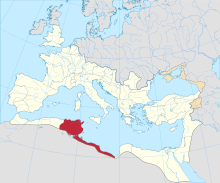
The Diocese of Suas is an ancient suppressed and titular see of the Roman Catholic Church in North Africa. [1] It dates from the Roman era. The bishopric was centered on the town of Chaouache in Beja.

The Diocese of Suas is an ancient suppressed and titular see of the Roman Catholic Church in North Africa. [1] It dates from the Roman era. The bishopric was centered on the town of Chaouache in Beja.

The Holy See, also called the See of Rome, Petrine See or Apostolic See, is the central governing body of the Catholic Church and the Vatican City State. It encompasses the office of the pope as the bishop of the Apostolic episcopal see of Rome and serves as the spiritual and administrative authority of the worldwide Catholic Church and the city-state. Under international law, the Holy See holds the status of a sovereign juridical entity.

Italy, officially the Italian Republic, is a country in Southern and Western Europe. It consists of a peninsula that extends into the Mediterranean Sea, with the Alps on its northern land border, as well as nearly 800 islands, notably Sicily and Sardinia. Italy shares its borders with France, Switzerland, Austria, Slovenia, and two enclaves: Vatican City and San Marino. It is the tenth-largest country in Europe by area, covering 301,340 km2 (116,350 sq mi), and the third-most populous member state of the European Union, with a population of nearly 60 million. Italy's capital and largest city is Rome; other major urban areas include Milan, Naples, Turin, Palermo, Bologna, Florence, Genoa, and Venice.

The pope is the bishop of Rome and the visible head of the worldwide Catholic Church. He is also known as the supreme pontiff, Roman pontiff, or sovereign pontiff. From the eighth century until 1870, the pope was the sovereign or head of state of the Papal States, and since 1929 of the much smaller Vatican City state. From a Catholic viewpoint, the primacy of the bishop of Rome is largely derived from his role as the apostolic successor to Saint Peter, to whom primacy was conferred by Jesus, who gave Peter the Keys of Heaven and the powers of "binding and loosing", naming him as the "rock" upon which the Church would be built. The reigning pope is Francis, who was elected on 13 March 2013.

Raymond Roman Thierry Polański is a French and Polish film director, producer, screenwriter, and actor. He is the recipient of numerous accolades, including an Academy Award, two British Academy Film Awards, ten César Awards, two Golden Globe Awards, as well as the Golden Bear and a Palme d'Or.

Rome is the capital city of Italy. It is also the capital of the Lazio region, the centre of the Metropolitan City of Rome Capital, and a special comune (municipality) named Comune di Roma Capitale. With 2,860,009 residents in 1,285 km2 (496.1 sq mi), Rome is the country's most populated comune and the third most populous city in the European Union by population within city limits. The Metropolitan City of Rome, with a population of 4,355,725 residents, is the most populous metropolitan city in Italy. Its metropolitan area is the third-most populous within Italy. Rome is located in the central-western portion of the Italian Peninsula, within Lazio (Latium), along the shores of the Tiber Valley. Vatican City is an independent country inside the city boundaries of Rome, the only existing example of a country within a city. Rome is often referred to as the City of Seven Hills due to its geographic location, and also as the "Eternal City". Rome is generally considered to be the cradle of Western civilization and Western Christian culture, and the centre of the Catholic Church.
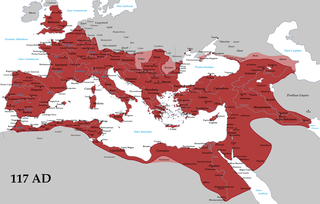
The Roman Empire ruled the Mediterranean and much of Europe, Western Asia and North Africa. The Romans conquered most of this during the Republic, and it was ruled by emperors following Octavian's assumption of effective sole rule in 27 BC. The western empire collapsed in 476 AD, but the eastern empire lasted until the fall of Constantinople in 1453.

Roman numerals are a numeral system that originated in ancient Rome and remained the usual way of writing numbers throughout Europe well into the Late Middle Ages. Numbers are written with combinations of letters from the Latin alphabet, each with a fixed integer value. The modern style uses only these seven:

Troy or Ilion was an ancient city located in present-day Hisarlık, Turkey. The place was first settled around 3600 BC and grew into a small fortified city around 3000 BC. During its four thousand years of existence, Troy was repeatedly destroyed and rebuilt. As a result, the archeological site that has been left is divided into nine layers, each corresponding to a city built on the ruins of the previous. Archaeologists refer to these layers using Roman numerals. Among the early layers, Troy II is notable for its wealth and imposing architecture. During the Late Bronze Age, Troy was called Wilusa and was a vassal of the Hittite Empire. The final layers were Greek and Roman cities which in their days served as tourist attractions and religious centers because of their link to mythic tradition.
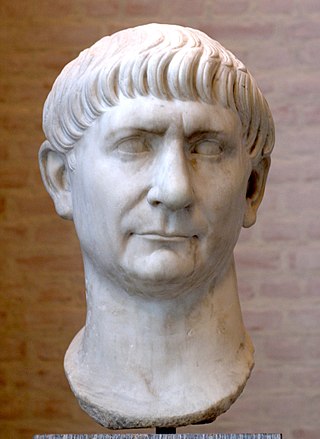
Trajan was a Roman emperor from AD 98 to 117, remembered as the second of the Five Good Emperors of the Nerva–Antonine dynasty. He was a philanthropic ruler and a successful soldier-emperor who presided over one of the greatest military expansions in Roman history, during which, by the time of his death, the Roman Empire reached its maximum territorial extent. He was given the title of Optimus by the Roman Senate.

Hepburn romanization is the main system of romanization for the Japanese language. The system was originally published in 1867 by American Christian missionary and physician James Curtis Hepburn as the standard in the first edition of his Japanese–English dictionary. The system is distinct from other romanization methods in its use of English orthography to phonetically transcribe sounds: for example, the syllable is written as shi and is written as cha, reflecting their spellings in English.

Marcus Aurelius Antoninus, better known by his nickname Caracalla, was Roman emperor from 198 to 217 AD. He was a member of the Severan dynasty, the elder son of Emperor Septimius Severus and Empress Julia Domna. Severus proclaimed Caracalla co-ruler in 198, doing the same with his other son Geta in 209. The two brothers briefly shared power after their father's death in 211, but Caracalla soon had Geta murdered by the Praetorian Guard and became sole ruler of the Roman Empire. Julia Domna had a significant share in governance, since Caracalla found administration to be mundane. His reign featured domestic instability and external invasions by the Germanic peoples.

The judiciary is the system of courts that adjudicates legal disputes/disagreements and interprets, defends, and applies the law in legal cases.
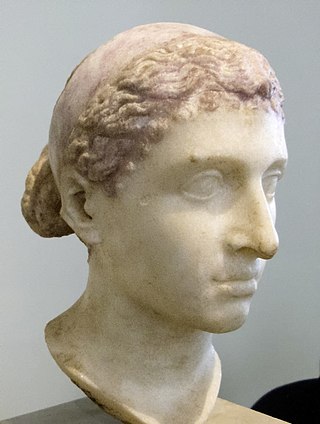
Cleopatra VII Thea Philopator was Queen of the Ptolemaic Kingdom of Egypt from 51 to 30 BC, and its last active ruler. A member of the Ptolemaic dynasty, she was a descendant of its founder Ptolemy I Soter, a Macedonian Greek general and companion of Alexander the Great. Her first language was Koine Greek, and she is the only Ptolemaic ruler known to have learned the Egyptian language. After her death, Egypt became a province of the Roman Empire, marking the end of the last Hellenistic-period state in the Mediterranean, a period which had lasted since the reign of Alexander.

Ancient Greece was a northeastern Mediterranean civilisation, existing from the Greek Dark Ages of the 12th–9th centuries BC to the end of classical antiquity, that comprised a loose collection of culturally and linguistically related city-states and communities. Prior to the Roman period, most of these regions were officially unified only once under the Kingdom of Macedon from 338 to 323 BC. In Western history, the era of classical antiquity was immediately followed by the Early Middle Ages and the Byzantine period.
Herod I or Herod the Great was a Roman Jewish client king of the Herodian kingdom of Judea. He is known for his colossal building projects throughout Judea. Among these works are the rebuilding of the Second Temple in Jerusalem and the expansion of its base—the Western Wall being part of it. Vital details of his life are recorded in the works of the 1st century CE Roman–Jewish historian Josephus.

Ashkenazi Jews constitute a Jewish diaspora population that emerged in the Holy Roman Empire around the end of the first millennium CE. They traditionally speak Yiddish, a language that originated in the 9th century, and largely migrated towards northern and eastern Europe during the late Middle Ages due to persecution. Hebrew was primarily used as a literary and sacred language until its 20th-century revival as a common language in Israel.

In linguistics, romanization is the conversion of text from a different writing system to the Roman (Latin) script, or a system for doing so. Methods of romanization include transliteration, for representing written text, and transcription, for representing the spoken word, and combinations of both. Transcription methods can be subdivided into phonemic transcription, which records the phonemes or units of semantic meaning in speech, and more strict phonetic transcription, which records speech sounds with precision.

The Catholic Church, also known as the Roman Catholic Church, is the largest Christian church, with 1.28 to 1.39 billion baptized Catholics worldwide as of 2024. It is among the world's oldest and largest international institutions and has played a prominent role in the history and development of Western civilization. The church consists of 24 sui iuris churches, including the Latin Church and 23 Eastern Catholic Churches, which comprise almost 3,500 dioceses and eparchies around the world. The pope, who is the bishop of Rome, is the chief pastor of the church. The Diocese of Rome, known as the Holy See, is the central governing authority of the church. The administrative body of the Holy See, the Roman Curia, has its principal offices in Vatican City, which is a small, independent city-state and enclave within the city of Rome, of which the pope is head of state and absolute elective monarch.
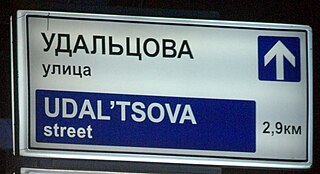
The romanization of the Russian language, aside from its primary use for including Russian names and words in text written in a Latin alphabet, is also essential for computer users to input Russian text who either do not have a keyboard or word processor set up for inputting Cyrillic, or else are not capable of typing rapidly using a native Russian keyboard layout (JCUKEN). In the latter case, they would type using a system of transliteration fitted for their keyboard layout, such as for English QWERTY keyboards, and then use an automated tool to convert the text into Cyrillic.

Leati Joseph "Joe" Anoaʻi, better known by his ring name Roman Reigns, is an American professional wrestler and former football player. He is signed to WWE, where he performs on the SmackDown brand. Regarded as one of the best professional wrestlers in the world, Reigns's 1,316-day reign as Undisputed WWE Universal Heavyweight Champion is the fourth-longest world title reign in WWE history and the longest championship reign since 1988.